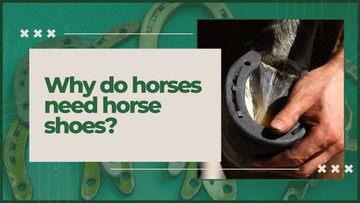Horse shoes are recognized as iconic by different equestrians and non-riders alike from around the world. These shoes are referred to as symbols of good fortune and also act as a vital tool for proper horse care. But have you ever stopped to wonder why do horses need shoes?
The story behind the horseshoe's importance reveals a very fascinating insight that evolves into the relationship between human beings and horses. Horse shoe is crafted to protect and enhance the health of the hooves of horses. This enabled them to thrive in various environments alike.
Evolution and History of Horseshoe Purpose
Have you ever wondered how different horseshoe types went from being a simple tool made by Romans in 100 BC to a symbol of good luck and pure will? Well, it is not just about horseshoe importance for keeping the feet of the horse in tip-top shape, but a beautiful journey that spans multiple centuries, cultures, and some seriously cool horse shoe innovations
When did they start shoeing horses? Well, thousands of years ago, villagers used lather and rawhide to protect equine barefoot. As horses without shoes became more and more important to a thriving society as they were used in travel and farming, horseshoe on hoof importance grew more than ever.
By the 12th century, iron horseshoes had emerged, which made hoof protection a lot more durable. Over time, the greatest blacksmiths of that time refined the whole process. This led to steel horseshoes becoming standardized by the 19th century.
What is the point of horseshoes?
In that era, and even today these became a symbol of good fortune, Their open-shaped design is believed to capture pure luck and ward off evil. These are often hung above doorways for protection.
Farriers and artisans did not stop at just the mere function but began to create fancy designs, which turned different horseshoe types into art pieces that celebrated both craftsmanship and the bond between human beings and horses.

Why do horses need horse shoes?
Have you ever seen a horse strut around in those shiny metal horseshoes and wondered “why do horse need shoes?” Well here’s a spoiler for you these horseshoes are not just for styling, as they do play a very major role in maintaining our horses healthy, comfortable, and ready to perform at their very best.
Benefits of Horseshoes:

-
Horse Hoof Protection:
Horses do face constant poundings on hard surfaces, be it roads, rocky terrains, or muddy fields. These demanding surfaces can surely take a toll on the equine barefoot. Here, a horseshoe on hoof comes in like a shield, preventing excessive wear, and tear, cracks, and severe injuries, which slows them down.
-
Boosting Horse Performance:
It’s amazing to see that horseshoes are not just about avoiding hoof damage. horseshoe importance begins when horses perform at their best. They give extra support, helping to distribute the weight evenly and reducing the strain on their hard-working legs.
-
Helping with Horse Health:
When there is a debate about horse shoes vs barefoot, horseshoes do gain an upper hand as they help with health issues. Some horses unfortunately come up with gait problems, injuries, or hoof conditioners which can make even a simple act of movement painful. Here, specially designed horse shoes can help in correcting these issues, providing relief, and even aiding in the process of healing for horse foot without shoe.
How often do horses need new shoes?
Most horses do require new shoes every 6-8 weeks to keep their hooves healthy. As the hooves begin to grow, horse shoes begin to get loose and uncomfortable. So regular replacements for the horses became a need.
Horses with faster-growing hooves will need more frequent shoeing and this goes for horses that walk on hard, and rocky surfaces, as they tend to wear the shoes down a lot quicker.
How Much Does It Cost to Shoe a Horse?
The cost of shoeing a horse differs depending on location, farrier expertise, and the type of shoes needed. To our main question “how much does it cost to shoe a horse?” Commonly, it can range from $50 to $150 or more for a full set. Therapeutic or specialty shoes may cost significantly more.
How to shoe a horse?
Ever have you wondered why do horses wear horse shoes? And most importantly, does shoeing a horse hurt? Well, generally, it is a pain-free process for the horses if it is done in the right way,
The first task of the professional farrier is to trim and shape the hooves. Then they select the shoe that fits the hoof and shape it to fit it perfectly according to the horseshoe purpose. The shoe is nailed on but it is not a thing to worry about as these nails are placed in the hoof wall perfectly where there are no sensitive tissues, eliminating the pain.
Finally, if there are any rough edges left, then they are rasped to make it a lot more comfortable for horses without shoes.
Common Myths About Horse Shoes
Despite being a crucial aspect of equine care, horse shoes are often surrounded by misconceptions that can lead to confusion among horse owners. Understanding the truth behind these myths can help you make informed decisions about your horse's hoof care.
Let’s uncover some of the most common myths about horse shoes and set the record straight.

1. Horse Shoes Hurt Horses:
A common belief is that nailing shoes onto a horse’s hooves is painful. However, this process does not hurt the horse because the hooves are made of keratin, the same material as human nails and hair.
When a professional farrier attaches the shoes correctly, the horse does not feel any discomfort. Pain only arises if the hooves are poorly maintained or if the nails are improperly placed, which emphasizes the importance of regular hoof care.
2. Horse Shoes Are Only for Protection:
While protection is a primary function, horse shoes serve various other purposes. They can provide therapeutic support for horses with conditions like laminitis or navicular disease, improve traction for horses working in challenging terrains, and even improve performance for racehorses or show horses. Shoes are more versatile than most people realize.
3. All Horse Shoes Are the Same:
Another misconception is that all horse shoes are identical. In reality, shoes come in different materials, sizes, and designs to cater to various needs.
For instance, racehorses often wear lightweight aluminum shoes for speed, while draft horses may need heavy-duty shoes for their strength and workload. Therapeutic shoes, like heart-bar or egg-bar shoes, are designed for specific medical conditions.
4. Barefoot Horses Are Always Healthier
While barefoot living can work well for many horses, it’s not the ideal solution for all. Horses that traverse rough or rocky terrain or those with weak or damaged hooves may require shoes to avoid injuries.
The key is to assess each horse’s individual needs and provide the care that suits them best, whether that includes shoes or not.
Conclusion:
So, there you have it. Horseshoe importance is not just limited to being a quirky accessory, as these essentials are a blend of history, protection, and pure craftmanship. From their ancient beginnings to becoming symbols of pure luck, these different horseshoe types are important for maintaining the health of the horseshoe on hoof, comfort, and making them ready to perform at their best anywhere.

For more expert tips on horse care and information, visit The Epic Animal today!
FAQs:
-
Why do horses need shoes but not cows?
Horses need shoes because their hooves are more prone to wear on hard surfaces, unlike cows, whose hooves are designed for softer terrain.
-
Why do wild horses not need shoes?
Wild horses roam on soft, natural surfaces that allow their hooves to wear down naturally, eliminating the need for shoes.
-
Do all horses need shoes?
Not all horses need shoes; it depends on their activity level, hoof condition, and the surfaces they walk on.
-
Are horseshoes good for horses?
Yes, horseshoes protect hooves, enhance performance, and support hoof health, especially on hard or rocky surfaces.
-
How to shoe a horse with ringbone?
A farrier uses special shoes to provide cushioning and support to alleviate pressure on the affected joint in horses with ringbone.
-
Does horseshoes hurt the horse?
Horseshoes do not hurt the horse when applied correctly, as nails are placed in the non-sensitive hoof wall.
Read More Blogs:

How Much Do Horses Weigh? Understanding Horse Weight







